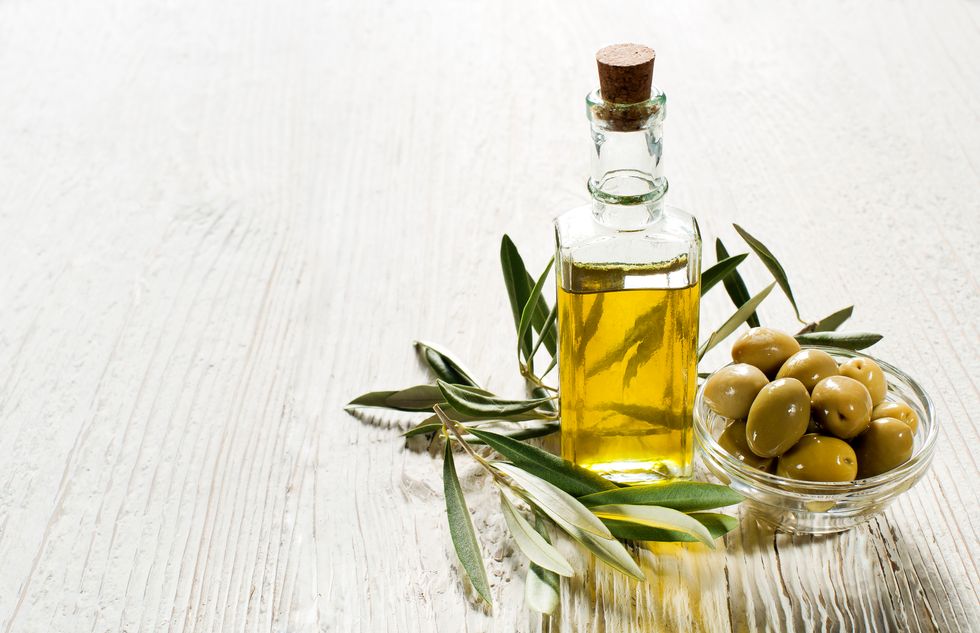It's likely been engrained into your head to choose low-fat foods over high-fat ones. You've been told they're the number-one enemy and to steer clear of them.
So, now, it makes logical sense that you're quite confused to hear people tout the benefits of healthy fats, encouraging you to integrate them into your meals and snacks. Why? New research has found that healthy fats are necessary and beneficial for good health, according to Harvard's School of Public Health. You just want to be sure that you focus on eating good-for-you fats instead of harmful bad fats.
Healthy fats, or “good" unsaturated fats, typically refers to monounsaturated and polyunsaturated fats. Among their heart-health benefits, these fats help reduce bad LDL cholesterol levels, which can lower your risk of heart disease and stroke. They also provide nutrients to help develop and maintain your body's cells, says the American Heart Association. Oils rich in these fats also contribute vitamin E to your diet, a vitamin needed more of by most Americans.
Saturated fats (while not as harmful as trans fats, discussed below) occur naturally in many foods. They're best consumed in moderation since they can negatively impact health. The majority of saturated fats come from animal sources, including meat and dairy products. Large amounts of saturated fats are included in foods like red meat, cheese, butter and ice cream.
Trans fats (listed on nutrition labels as partially hydrogenated oils) are harmful even when eaten in small quantities. The American Heart Association says that trans fats raise your bad LDL cholesterol levels and lower your good HDL cholesterol levels. And eating these fats increases your risk of developing heart disease and stroke and is associated with a higher risk of developing type 2 diabetes.
Here are some foods brimming with good-for-you fats that you should consider adding to your diet.
Avocados
Avocados primarily contain heart-healthy monounsaturated fats. Plus, they're loaded with filling fiber, potassium and vitamin C. They're sodium- and cholesterol-free and a good source of lutein, an antioxidant that may protect your vision. This pilaf pairs avocados and bell peppers with red quinoa and grilled chicken for a satisfying, colorful meal.
Fish
Seafood is the best source of omega-3 fatty acids, which promote cardiovascular and all-around health. Eating just two servings of fatty fish a week can reduce your risk of dying from heart disease by 36 percent. Aim for oily fish like salmon, sardines, mackerel and trout. Spice things up with this Garlic Salmon, or give yourself a dose of omega 3s and healthy spinach by cooking this Baked Salmon With Sauteed Spinach.
Olives and olive oil
Both olives and olive oil are rich in monounsaturated fats. No matter what kind of olive you sample, all are loaded with nutrients and deliver plant sterols, compounds that can lower LDL (bad) cholesterol. And olive oil has become the go-to cooking oil in the kitchen thanks to the fact that it's loaded with monounsaturated fats. (Just don't overdo it.) Serve this colorful California Fiesta Quinoa Salad at your next barbecue. Or try this Roasted Brussels Sprouts and Grapes, which contains olive oil. It balances the slightly bitter flavor of Brussels sprouts with the sweetness of grapes for a delicious, healthy side dish.
Walnuts
This nut offers an optimal balance of healthy fats, including omega-3s. Plus, walnuts contain antioxidants and phytonutrients that are known to help lower inflammation levels and prevent type 2 diabetes. And they're rich in melatonin, which promotes a healthy sleep cycle. To reap walnuts' benefits, you don't have to eat a tree's worth. Sprinkle a handful of walnuts on your entrée salad or atop your morning oats. For a snack, mix one cup walnuts with ½ cup dried blueberries and ¼ cup dark chocolate chunks. (Just don't eat it all in one day.)
Dark chocolate
Chocoholics rejoice! About three fingers' worth, or one ounce, of dark chocolate gives you a nice dose of healthy fats. Plus, it boasts other nutrients like vitamin A, B and E, calcium, iron, potassium, fiber and magnesium. Consider incorporating dark chocolate chips along with nuts, seeds, whole grain cereal and dried fruit for an easy trail mix to bring with you on the go. For a special indulgence, cook up these chunky chocolate brownies, made with healthy ingredients, including prune puree, which substitutes for added fat.
Nut seeds and nuts
For a plant-based dose of monounsaturated and polyunsaturated fats, try almond or cashew butter or sunflower seed butter. Choose all-natural varieties with as few ingredients as possible. On their own, rice cakes aren't the most filling snacks, but they offer about as much versatility as bread or crackers with a fraction of the calories and carbohydrates. They're a crispy canvas for a variety of toppings including nut butter, topped with fresh or dried fruit for extra fiber.







